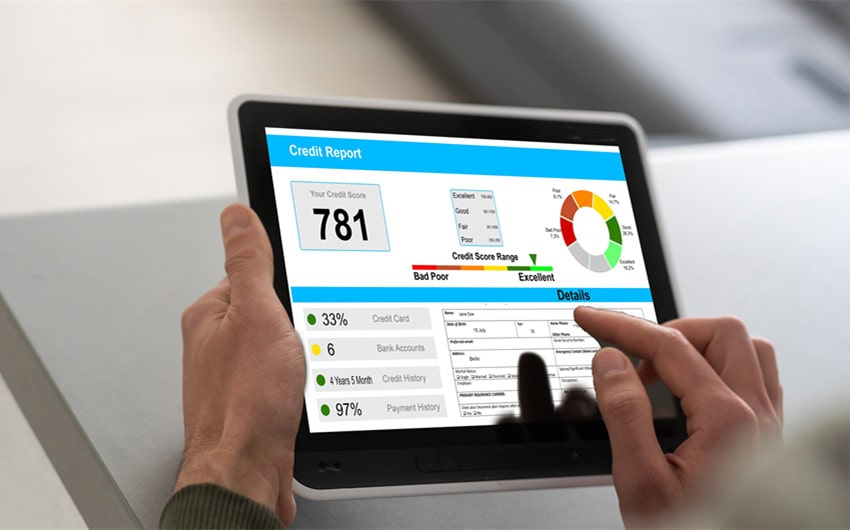The credit scores have a huge role in the process of applying for a mortgage. Mostly, it has a huge impact on the interest rates and terms you are likely to get. The lender will use your credit score to know whether you are a reliable borrower or not. Higher scores are basically those showing lesser cases of defaulting. A good credit score could mean thousands of dollars in savings over the life of the loan, due simply to a better interest rate on your mortgage.
Review Your Credit Report
The initial step many consumers should take in an effort to boost their credit score is to review their credit report. Your credit history, how you pay, how you utilize credit, and have or owe money in general is all included in the credit report. This report is what you will want to examine to make sure there are not mistakes that could be damaging to your score.
In this section of the report, common mistakes might include things like wrong current account balances, outdated personal information, or even accounts that are not yours. If you find something wrong, you need to argue with the credit bureaus to get them removed or corrected.
Reducing Outstanding Debt
One of the most effective ways to improve your credit is reducing outstanding debt, specifically credit card balances. Your credit utilization ratio—how much credit you are currently using in comparison to your total available credit—is one of the most important factors in your credit score. Lenders favor borrowing with a credit utilization ratio of 30% or lower.
A decrease in your credit utilization ratio is attainable by paying your balances with the result of an increased credit score. In addition, consistent paying off of your debt shows potential lenders that you are responsible in the use of credit
Not Applying For New Credit
Do not go for excess new credit cards or loans, especially when they have tantalizing offers. This will hurt your credit score because every time you apply to receive new credit, a hard inquiry is conducted on your credit report, with its result deducting a few points, which will go back to normal after 2 years.
Many hard inquiries within a short period may indicate to the lender that you’re taking on excessive debt, and therefore riskier to lend to. Therefore, it is best to avoid seeking new credit in the months prior toward your mortgage application.
Making On-Time Payments
The factor carrying the biggest impact on your credit score is your payment history, accounting for roughly 35% of your overall score. Late payments or missing payments altogether, can degrade the score considerably.
In order to have a decent credit score when you are applying for a loan in a house, you must make all the payments on time. This most definitely applies to credit card and loan payments but extends to utility bill payments. You can use automatic payments or even set reminders when the payments are due so that you can never miss a deadline, so doing makes your credit score better.
Low Credit Card Balances
High credit card balances hurt your credit score because they increase your credit utilization ratio. Decreasing these credit card balances will help increase your credit score. Start by paying off the cards that have the highest interest rates or those that are pushing the limits of their credit line.
Reducing those balances does not only lower your credit utilization, but also decreases the interest you will have to pay up, thus freeing up more money for other financial goals such as saving for a down payment on a house .
Avoid Closing Old Credit Accounts
While closing old credit accounts may seem a prudent way of simplifying your finances, doing that could have grievous implications on your credit account. Closing an account will decrease your available credit and therefore increase your credit utilization ratio. Older accounts will also serve to lengthen your credit history.
Unlike the rest of your personal finance journey, these tips can help with improving your credit starting almost immediately. Rather than close older accounts, consider keeping them open and using them from time to time for minor purchases that can be quickly paid off.
Getting Professional Advice
If you are confused about any of the steps in increasing your credit score or need to know the best course of action for your situation, consider consulting a professional. Mortgage brokers, financial advisers, or credit counselors can provide you with personalized advice founded on consideration of both your financial goals and credit history.
They will help you come up with a plan to improve your credit score and start you on the right track for applying for a mortgage. Working with professionals can assure you that your credit score is being improved without much ado
It simply means that once one improves their credit score and later applies for a mortgage loan, they are already guaranteed eligibility for concessional loan terms. That simply means rebuilding your credit score by checking the information in your credit report, paying down debt, not applying for new credit, making on-time payments, and accessing professional advice at every step.
This will give your credit score a much-needed boost, qualify you for mortgages with better rates, and increase the chances of availing one. By having a good credit score, you’ll be better positioned to achieve all your goals regarding homeownership and related benefits.







